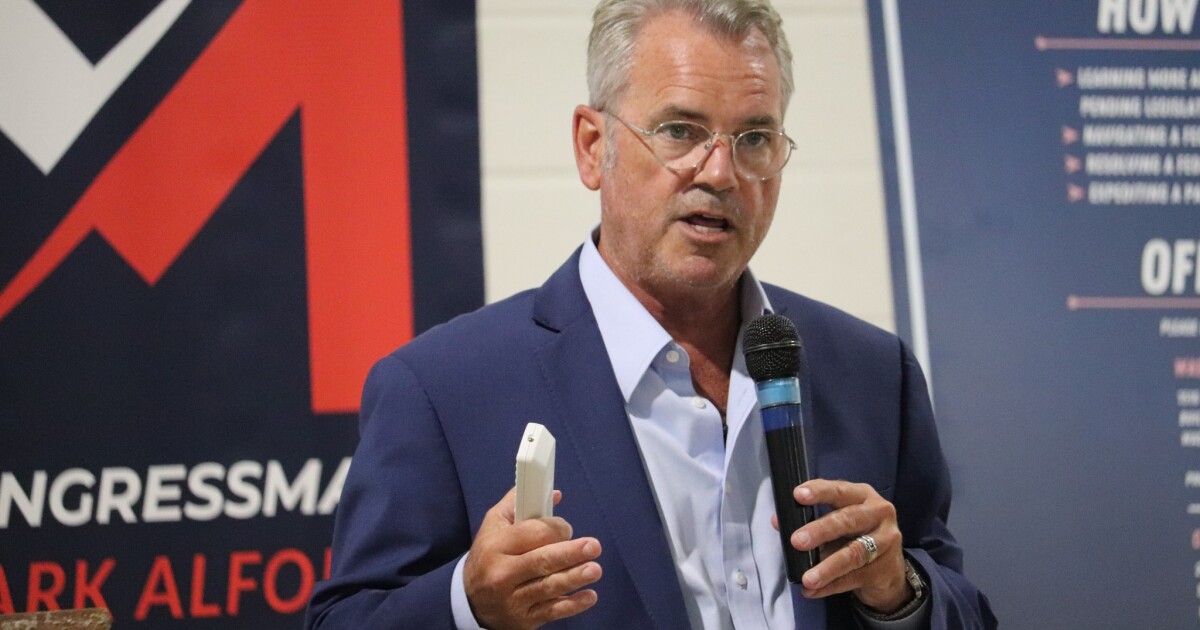Politics
Pritzker pushes measure to change Illinois pension funding plan
SPRINGFIELD, Ill. — With a month-and-a-half left in the Illinois General Assembly’s spring session, Gov. J.B. Pritzker’s administration is readying its proposal to address the state’s chronically underfunded pension system.But the governor last week also acknowledged in the strongest terms yet that any plans to finally get the state on track toward fully funding retirement plans for public school teachers, university employees and state workers could be derailed by a looming legal fight over a 14-year-old law.Pritzker’s comments came as Illinois’ two influential statewide teachers unions were wrapping up a “week of action,” encouraging their members to call and email lawmakers and urge them to essentially “undo” a 2010 law that created a new less generous pension system for those who began their jobs after Jan. 1, 2011.The General Assembly and then-Democratic Gov. Pat Quinn quickly approved that law in the wake of the Great Recession, which forced state leaders to grapple with decades of underfunding in Illinois’ pension systems.But in the years since, economists and labor leaders have repeatedly warned that the retirement benefits in the Tier 2 system are so low, they might violate federal “Safe Harbor” laws. Those laws dictate Social Security replacement plans, like pensions, can’t offer benefits that don’t at least match Social Security.Lawmakers – the majority of whom were not in the legislature when Tier 2 was passed – have picked up on those warning signs, and in the last few years have been studying the issue in occasional committee hearings. In February, Pritzker signaled his willingness to get ahead of the looming legal issue, and on Thursday he took a big step forward in his position.“We need, obviously, to make some changes to Tier 2 to make sure that we’re meeting the Social Security Safe Harbor,” the governor said at an unrelated news conference late Thursday night in his Capitol office. “We don’t yet really know what that’s going to cost.”Earlier in the day, Pritzker’s top budget advisor, Governor’s Office of Management and Budget Director Alexis Sturm, told a House committee that the governor was “open to that conversation” about increasing the cap on Tier 2 pension earnings to match Social Security.Ahead of Pritzker’s annual budget address in February, Sturm and other top staffers laid out a larger plan to address Illinois’ underfunded pension systems, which included a nod to the Social Security issue.Read more: With budget proposal and fiery address, Pritzker paints himself as progressive pragmatistAt the time, the plan merely encouraged the boards of the state’s retirement systems for teachers, university employees and state employees, along with the legislature, to “review and adjust, if necessary, the structure of the Tier 2 pensionable earnings cap.”But in acknowledging the Tier 2 issue on Thursday, the governor also signaled to New York-based credit ratings agencies that he was still committed to fiscal moves that would earn the state further credit upgrades. Pritzker said state leaders “just need to be exceedingly careful” about pension “sweeteners” – including any fix made to Tier 2 pensions.“So that, in a way, is a sweetener in the sense that it’s going to cost taxpayers something,” Pritzker said. “But we have to do it because the alternative would cost the taxpayers much more.”There is no official price tag on tweaking the law to comply with Social Security rules, but one analysis run for the state’s Commission on Government Forecasting and Accountability last year estimated it could cost the state $5.6 billion through 2045, or about $255 million annually.Path to 2048Sturm’s appearance in a House committee Thursday was intended to sell lawmakers on the governor’s plan to fully fund Illinois’ pensions by 2048. Pritzker’s team had laid out the proposal ahead of his budget address in February, and one credit rating agency immediately signaled its approval.Read more: Pritzker proposes over $2B in spending growth, backed by tax increases for corporations, sportsbooksThe plan would alter a 1995 law signed by then-Republican Gov. Jim Edgar that put the state on a 50-year ramp to get Illinois’ pension systems to a 90 percent funded level by 2045.Pritzker wants to extend that deadline three more years, but up the funding goal to 100 percent. He’s also pushing to keep spending half of the amount of money Illinois is currently spending on debt repayment for old bonds taken out in 2003 and 2017 when they’re retired in the early 2030s and put that money toward the pension systems.The 2003 bonds were taken out to pay for pensions during Democratic Gov. Rod Blagojevich’s administration, and the 2017 bonds were sold in the aftermath of the state’s two-year budget impasse under Republican Gov. Bruce Rauner to help pay down Illinois’ record near-$17 billion backlog of unpaid bills accumulated during the political struggle.Sturm called the plan a “balanced” way to address Illinois’ longstanding practice of not paying enough into its pension systems, creating an ever-growing sum of unfunded liabilities.“It was there in the ‘90s, it was there in the ‘70s and the ‘40s,” Sturm said of the pension debt.She also clarified that Pritzker is “not interested” in issuing any bonds to put an infusion of cash into the state’s pension systems, a move made under Quinn in 2010 and 2011 several years after the state borrowed $10 billion in the 2003 bond sale under Blagojevich.Thursday’s discussion on the pension plan was subject matter only, meaning it did not receive a vote from the committee. It’s unclear if the measure will pass before lawmakers adjourn their spring session in May.Just as in the past, public employee unions will likely have tremendous influence over whether the legislature approves the governor’s pension plan.Pat Devaney, the secretary-treasurer of the Illinois AFL-CIO organized labor umbrella organization, told the panel Thursday that the We Are One Illinois coalition – a group of unions that formed after the Tier 2 pension system law passed – was not yet taking a stance on Pritzker’s plan.“It is difficult to provide comprehensive comments on the governor’s proposal without having specific legislative language and funding projections to review,” he said. “That said, the problematic nature of the current funding ramp is well-documented.”The coalition, Devaney said, “generally” supports making larger-than-necessary contributions to the state’s retirement systems.“The state has always set forward with a plan to underfund the pension systems,” he said. “We’re encouraged that the governor has a plan to actually fund it to 100 percent and come out with a deliberate, responsible way to provide that funding.”Tier 2 historyBut Devaney had a much more strident position to share with House members about Tier 2 pensions.“We can do that,” he said of Pritzker’s plan to shore up Illinois’ pension systems. “But we can also address the illegal, immoral, and, frankly, things that are hurting the operations of government at every level with the Tier 2 benefit level.”After a long pause, state Rep. Steve Reick, R-Woodstock, signaled his agreement – with a big caveat.“Yeah, but how?” Reick said. “That’s the thing that we need to get people together in a room and talk about because this isn’t gonna get any better for the next 20 years. I’m not going to be here 20 years from now but…I’d like to leave knowing that we started something that would get us to where we want to be.”Reick said his email inbox has been inundated with messages about the Tier 2 pension system. The Illinois Federation of Teachers and Illinois Education Association – the state’s two largest teachers unions – have encouraged their members to flood their local lawmakers with requests to address the Tier 2 pension system.As of Thursday evening, union members had sent more than 55,000 letters this week to lawmakers urging them to “fix” Tier 2 pensions, according to the Illinois AFL-CIO.“I mean, I get a lot of emails from people who demand that we do away with Tier 2 altogether and go back to Tier 1,” Reick said later on during the hearing. “Um, that’s not going to work.”As Illinois began its slow recovery from the Great Recession, lawmakers were facing a sudden jump in unfunded pension liabilities, due in part to poor investment returns as the stock market hobbled its way to recovery. But the General Assembly also felt the squeeze from decades of decisions from their predecessors shorting the state’s pension systems.Beginning in 2009, credit rating agencies began a series of downgrades to Illinois’ ratings of creditworthiness, making it more expensive for the state to borrow money via bond sales. In explaining their reasoning at the time, the influential agencies repeatedly noted the state’s pension systems were underfunded.The financial downturn came not long after the state skipped out on paying half of its pension obligation for two years under Blagojevich, which came on the heels of more than 11,000 state workers taking early retirement under Republican Gov. George Ryan. Both moves increased the liability to the state’s pension systems by billions of dollars.So in 2010, the Democratic-controlled General Assembly created the new Tier 2 system, which nixed the Tier 1 practice of 3 percent compounded annual cost of living adjustments for retirees, raised the age for retirees to get full benefits from 62 to 67 and changed eligibility for full benefits from five years of service to 10 years.Tier 2 also caps the maximum salary a pension can be based on and changes the calculation of the base salary to discourage a practice known as pension “spiking,” wherein those close to retirement age would seek raises to substantially increase their pension under the Tier 1 system.Because it takes a decade to “vest” in the Tier 2 pension system, those who made late-career switches to government employment have begun to be eligible for retirement only in the last few years.Capitol News Illinois is a nonprofit, nonpartisan news service covering state government. It is distributed to hundreds of newspapers, radio and TV stations statewide. It is funded primarily by the Illinois Press Foundation and the Robert R. McCormick Foundation, along with major contributions from the Illinois Broadcasters Foundation and Southern Illinois Editorial Association.
Politics
Petition to legalize abortion in Missouri turns in signatures
A petition seeking to place abortion rights in the Missouri Constitution collected more than double the number of signatures needed to place the issue on the ballot.Missourians for Constitutional Freedom said the group turned in more than 380,000 signatures to the secretary of state’s office on Friday. The number needed to place a proposed constitutional amendment on the ballot is roughly 171,000.Speaking to a group of supporters at the Capitol on Friday morning, Kennedy Moore with Abortion Action Missouri said signatures were gathered in all of Missouri’s 114 counties.“That shows that Missourians in every corner of the Show-Me State don’t want to be subjected to abortion bans,” Moore said. “They don’t want to live in a state that restricts access to and puts medical decisions in the hands of politicians.”For a proposed amendment to make it onto the ballot, signatures must be collected by 8% of legal voters in six of Missouri’s eight congressional districts. The group said it achieved that threshold in six districts.Now, the signatures go to the secretary of state’s office to be verified.Tori Schafer with the ACLU of Missouri said there should not be any hiccups over the signatures in the coming weeks because “we clearly followed the law.”“We are of course preparing for anything, and we’re confident that any attacks that we experienced are politically motivated and we’ll win again in court,” Schafer said.
Sarah Kellogg
/
St. Louis Public Radio Tori Schafer, with the ACLU of Missouri, speaks to supporters of an initiative petition that seeks to enshrine abortion rights in the state constitution on Friday.
The proposed petitions faced multiple lawsuits that ultimately shortened the length of time the organization had to collect signatures.One of the suits was over the amendment’s fiscal note, where the auditor and secretary of state’s office disagreed over who had the authority to finalize the note.Attorney General Andrew Bailey’s office refused to approve the note created by Auditor Scott Fitzpatrick issued on the petition. Bailey’s office wanted Fitzpatrick to redo it to say the abortion ban would cost Missouri billions of dollars.Both a Cole County circuit judge and the Missouri Supreme Court ruled against Bailey.The other lawsuit was over the wording of the ballot language initially issued by Secretary of State Jay Ashcroft.The Missouri Western Court of Appeals ruled that Ashcroft’s summaries contained politically partisan language. The court also upheld, with few changes, a revised summary written by Cole County Circuit Judge Jon Beetem.“In March of 2023, we filed this amendment to end our state’s abortion ban, and immediately we were met with political attacks. State officials used the legal system to delay us from collecting signatures,” Schafer said.Unless Ashcroft expedites the signature counting process, Missourians will likely vote on the issue in November if the issue is placed on the ballot.
Sarah Kellogg
/
St. Louis Public Radio A “Decline to Sign” sign hangs on the office door of Sen. Nick Schroer, R-Defiance. Schroer participated this week in a filibuster of over 40 hours in an effort to bring forward a resolution that if passed by voters, would make it harder to amend Missouri’s constitution. The filibuster ended without that resolution being taken up.
The prospect of abortion rights being on the ballot spurred anti-abortion activists to try to stop people from signing the petition.“In our Decline to Sign Campaign, Missouri Right to Life has educated and activated countless Missourians to fight the battle to ‘Keep Missouri Pro-Life!'” Missouri Right to Life said in a statement.It has also renewed calls for the passage of a proposed constitutional amendment that would make it harder to change Missouri’s constitution.This week, a faction of state senators filibustered for more than 40 hours in an attempt to bring forward and pass a resolution that would require any proposed constitutional amendment to win both a simple majority of voters and a majority in each of Missouri’s eight congressional districts to take effect.“Here we are today, in the midst of one of the longest filibusters that this chamber has seen this year in order to bring to fruition our efforts to protect the constitution of this state from the abortionists who are trying to enshrine the institution of death into the constitution,” Sen. Bill Eigel, R-Weldon Spring, said.Ultimately, the filibuster ended before that resolution passed. There are two weeks left in the 2024 legislative session.The deadline to turn in signatures for proposed constitutional amendments or state law changes is May 5.Other groups that have turned in their signatures include one advocating for a state law change to raise the minimum wage and another that seeks to legalize sports betting.
Politics
Congressman Alford says the U.S. must continue to support Taiwan

It’s been over a week since Congress put the finishing touches on a foreign aid package to help Ukraine, Israel and Taiwan.And while much of the attention and focus is around opposition to providing military assistance to Ukraine and Israel, there’s been less debate about helping Taiwan blunt any potential invasion from China.U.S. Rep. Mark Alford, R-Cass County, recently traveled to Taiwan as part of a bipartisan delegation. In an interview earlier this week on the Politically Speaking Hour on St. Louis on the Air, Alford stressed that both Congress and the executive branch need to remain focused on stemming China’s growing influence.“I know we don’t officially recognize them as a nation, but they are very independent-minded people, a beautiful island that needs our help,” Alford said. “They need our help in deterring the Communist Chinese from further aggression.”China has long maintained that Taiwan is part of its territory, even though Taiwan is a representative democratic republic compared to China’s one-party communist state.When asked if the $8 billion in aid to Taiwan could provide an inference that the United States considers the island to be an independent country, Alford replied, “I think that’s always a possibility.”Recent polling shows that the vast majority of Taiwanese respondents prefer the status quo, as opposed to reunification with China or a declaration of independence.“We do have key provisions of the Taiwan Relations Act, which include making available to Taiwan the defense articles and services that they need to maintain a sufficient self defense capability,” Alford said. “That’s what we’ve agreed to, and we need to live up to that capability, no matter what lies down the road. It’s the same as President Reagan said, peace through strength.”China is nearly 60 times larger in terms of population than Taiwan — which Alford acknowledged would make any Chinese potential invasion daunting to combat.He added that it makes sense to aid the Taiwanese when China is trying to expand its reach around the globe.“They are building investments through the Belt and Road Initiative in our hemisphere. They are intent on having an influence,” Alford said. “They’re building ports, airports, seaports, roadways, and bridges to where they can exert pressure on these nations, and supplant us as a leading economic and world power.”Alford voted for Israel aid but against Ukraine assistanceMembers of the House had the opportunity to vote on whether to aid Ukraine, Taiwan and Israel separately. Alford backed military assistance for Israel but voted against aiding Ukraine.Some Republicans, including former President Donald Trump, suggested that aid to Ukraine should come in the form of a loan. But there’s been no such push to make aid to Israel or Taiwan a loan even though the governments in both countries could hypothetically pay for military equipment themselves.
Rep. Alford joins the Politically Speaking Hour on St. Louis on the Air
Alford said aiding Taiwan makes sense, but a war with China could have a devastating impact on the world economy. He also said it was important to aid Israel because “they are a leader, a beacon of hope and freedom and democracy in the Mideast.”“I believe that they are God’s chosen people, that this is their land, they are willing to live in harmony if those other people who are in that land are willing to live alongside them as well,” Alford said. “But that has been the issue. They do not want Israel to be there. They do not want the State of Israel to exist.”Alford has been against Ukrainian aid because he said U.S. military personnel can’t provide a clear case about what “victory looks like.”“Taxpayers should not be continuing to fund this mission until we know what victory is defined as,” he said.“St. Louis on the Air” brings you the stories of St. Louis and the people who live, work and create in our region. The show is produced by Ulaa Kuziez, Miya Norfleet, Emily Woodbury, Danny Wicentowski, Elaine Cha and Alex Heuer. The audio engineer is Aaron Doerr, and the production intern is Roshae Hemmings. Send questions and comments about this story to talk@stlpr.org.Send questions and comments about this story to feedback@stlpublicradio.org.
Politics
Bailey’s Missouri trans tip line flooded with pro-trans support
A tip line created by Missouri Attorney General Andrew Bailey to collect complaints about gender-affirming care received thousands of responses before it was shut down in April 2023.At the time, Bailey’s office provided little explanation beyond suggesting that the service had been hacked by “far left activists…trying to impede parents’ ability to shed light on what happened to their children.”But records obtained by St. Louis Public Radio through a Sunshine Request show a different story playing out in the short-lived tip line: Its first 48 hours of existence cover thousands of pages and more than 400 emails. Despite Bailey’s call for the public to provide accounts of abuse at the Washington University Transgender Center at St. Louis Children’s Hospital, the majority of the tip line’s first replies defended gender-affirming care, praised the clinic and instead used the provided form to submit complaints about Bailey and the tip line itself.Becky Hormuth, a teacher and mother of a 17-year-old trans child, made one of the first replies that came into the tip line on March 23, 2023. In her message, she wrote that Bailey was “trying to bully and dismiss the rights my husband and I have as parents.”Looking back on her response a year ago, Hormuth said she was fearful that the tip line would become a tool used by Republican lawmakers in their efforts to end trans care in Missouri. She saw it as a potential danger.“I was afraid of it, not just for our family and my child in general, but for all transgender individuals in Missouri,” she told St. Louis on the Air. “I felt like it was a hunt to find evidence of something that was unfounded….It’s harming my family.”The tip line lasted only a month, ending on April 21, 2023 — but Bailey’s efforts were followed weeks later by a trans care ban passed by Missouri’s Republican-majority legislature. Although that law seemingly included an exception for trans minors already receiving care, in August, Washington University announced it would no longer provide gender-affirming care to patients under 18, citing “unsustainable liability for health-care professionals” triggered by the new law.One of those patients turned away from the clinic was Hormuth’s son, Levi. He now travels to Illinois to receive gender-affirming care like testosterone.When he and his mother found out about the clinic closing its doors to trans kids, “we kind of broke down,” Levi recalled. “My mom, she immediately started calling into places outside of the state, because nobody in state would take anybody more or take new patients. So we had to resort to Illinois. And that took more extra time to get into that clinic. It was emotional and scary and horrible to go through. But we were able to adapt.”Bailey’s investigation of the clinic is ongoing. His office did not respond to questions from St. Louis on the Air about the total number of respondents to the tip line or what role the complaints have in the investigation.Although they do not contain evidence of hacking, the records of the tip line’s first 48 hours appear to confirm reports of activists trying to jam the service with trolling, jokes and insults directed at Bailey. One March 23 email began with the script of the 2007 animated film “Bee Movie” and continued for more than 2,800 pages.To hear more about Andrew Bailey’s trans tip line and how it affected trans people and families, listen to St. Louis on the Air on Apple Podcast or Spotify or by clicking the play button below.
Records reveal responses to Andrew Bailey’s trans tip line
“St. Louis on the Air” brings you the stories of St. Louis and the people who live, work and create in our region. The show is produced by Miya Norfleet, Emily Woodbury, Danny Wicentowski, Elaine Cha and Alex Heuer. Roshae Hemmings is our production assistant. The audio engineer is Aaron Doerr. Send questions and comments about this story to talk@stlpr.org.
-

 Entertainment1 year ago
Entertainment1 year agoSt.Louis Man Sounds Just Like Whitley Hewsten, Plans on Performing At The Shayfitz Arena.
-

 Business1 year ago
Business1 year agoWe Live Here Auténtico! | The Hispanic Chamber | Community and Connection Central
-
Board Bills1 year ago
2022-2023 Board Bill 189 — Public Works and Improvement Program at the Airport
-

 Local News1 year ago
Local News1 year agoVIDEO: St. Louis Visitor Has Meltdown on TikTok Over Gunshots
-

 News1 year ago
News1 year agoTed Lasso-inspired pop-up bar now open in St. Louis
-

 Board Bills1 year ago
Board Bills1 year ago2022-2023 Board Bill 165 — Jefferson Arms Community Improvement District
-
Board Bills1 year ago
2022-2023 Board Bill 183 — Amending Ordinance Number 62885 known as the Capital Improvements Sales Tax
-
Board Bills1 year ago
2022-2023 Board Bill 180 — Right to Counsel for Tenants Facing Eviction




